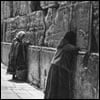Each year thousands of Jews converge on the Western Wall in Jerusalem to mark Tishah B'Av, our National Day of Mourning. On this day in history, both our Holy Temples were destroyed, we were exiled from our land, and a host of other calamities occurred throughout the centuries.
Some may wonder: why do we still mourn? Don't we have a sovereign state of Israel? Isn't Jerusalem united under Jewish rule today? Why are we still mourning?
The fact is that no Israeli rabbis have ever suggested that Tishah B'Av be deleted from our calendars. Nor have the staunchest, most zealous Zionists ever proposed doing away with the custom of breaking a glass under the Chupah. This tradition has always reminded us that our personal joy is incomplete until our nation's joy is re-established. And that requires the total restoration of our national life, including Jerusalem rebuilt.
Thank G‑d, since 1967 we are again able to visit the Western Wall. But as important as that sacred shrine may be, it is only a pitiful remnant of a glorious temple that once stood inside those walls. In fact, according to Torah law, when we visit the Wall we should rend our garments like a mourner because we are witnessing the site of the churban, the destruction of our Holy Temple.
So the reality is that although we have a Jewish state operating in our eternal homeland, the national state of exile is more than just geographical. Exile, galut, is a state of being and not a place on the map. It does not mean the Diaspora, as if to suggest that only Jews living outside the borders of Israel are in exile. Whether we live in Jerusalem or Johannesburg, we are all in exile. Until the era of Redemption arrives and the Temple is rebuilt the exile isn't over. You might live in an apartment in the old city of Jerusalem overlooking the Western Wall but you, too, are in exile because the entire Jewish People is still in a state of exile.
It is not only a question of place; it is a question of time. At this time in our history, the redemption has not yet arrived. We still pray three times a day that the Temple be rebuilt speedily in our time. And until those prayers are answered, I'm afraid we are all still in galut.
Sure, it would have been wonderful if David Ben Gurion's announcement in 1948 spelled out not only a declaration of independence but also real, practical and total independence. The truth, however, is that we are far from independent. We can proclaim our sovereign rights from today till tomorrow but we are still very dependent on America, on Europe, on public opinion, on the media and even, to a degree, on the United Nations.
We are certainly not yet independent of Hamas and Hizbollah with whom we are waging a real war as I write these lines.
When Jewish lives are being lost daily to terrorist armies, when our neighbors still dream of driving us into the sea, when they still deny us our basic legitimacy, when the international media challenges our right to defend our citizens, can we claim that we are really and truly independent?
Thank G‑d we have an army, navy and air force. Thank G‑d; they are fighting valiantly to thwart our mortal enemies' murderous machinations. But true independence means that our national security is no longer threatened and that a genuine and lasting peace has been achieved. No wonder Moshiach is called the Messenger of Peace. Who else can we turn to for that long-awaited dream? Political schemes certainly do not seem very promising.
And so we still observe Tishah B'Av. And unless Moshiach comes before that day we will fast and sit on low chairs in the manner of mourners. We will mourn the destruction of our temple and the state of exile it created. And we will pray for the full return to Jewish sovereignty and total independence. A time when our cities and towns will be free of enemy rockets and our children will feel safe and secure. May that time be now.








Join the Discussion